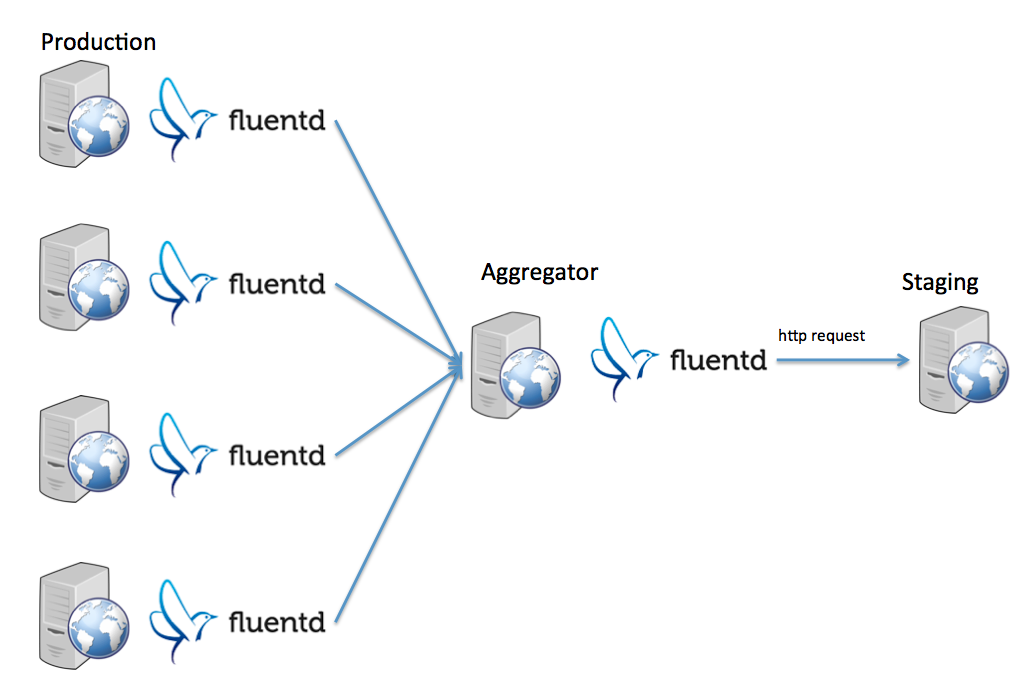copy http request. use shadow proxy server.
restored the http request from the logs that are sent to the fluentd.
<source>
type tail
format apache
path /var/log/httpd/access_log
pos_file /var/log/td-agent/access.pos
tag apache.access
</source>
<match apache.access>
type http_shadow
host staging.exsample.com
path_format ${path}
method_key method
header_hash { "Referer": "${referer}", "User-Agent": "${agent}" }
</match>
Assume following input is coming:
{
"host": "exsample.com",
"ip_address": "127.0.0.1",
"server": "10.0.0.11",
"remote": "-",
"time": "22/Dec/2014:03:20:26 +0900",
"method": "GET",
"path": "/hoge/?id=1",
"code": "200",
"size": "1578",
"x_forwarded_proto": "http",
"referer": "http://exsample.com/other/",
"agent": "Mozilla/5.0 (Windows NT 6.1; Trident/7.0; rv:11.0) like Gecko"
}
then result becomes as below (indented):
GET http://staging.exsample.com/hoge/?id=1
#=> HTTP HEADER
#=> "referer": "http://exsample.com/other/"
#=> "agent": "Mozilla/5.0 (Windows NT 6.1; Trident/7.0; rv:11.0) like Gecko"
<match http_shadow.exsample>
type http_shadow
host_hash {
"www.example.com": "staging.example.com",
"api.example.com": "api-staging.example.com",
"blog.ipros.jp": "blog-staging.ipros.jp"
}
host_key host
path_format ${path}
method_key method
protocol_format ${x_forwarded_proto} # default: http
header_hash { "Referer": "${referer}", "User-Agent": "${user_agent}" }
no_send_header_pattern ^(-|)$
</match>
<match http_shadow.exsample>
type http_shadow
host_hash {
"www.example.com": "staging.example.com",
"api.example.com": "api-staging.example.com",
"blog.ipros.jp": "blog-staging.ipros.jp"
}
host_key host
path_format ${path}
method_key method
header_hash { "Referer": "${referer}", "User-Agent": "${user_agent}" }
cookie_hash {"rails-app_session": "${session_id}"}
</match>
<match http_shadow.exsample>
type http_shadow
host_hash {
"www.example.com": "staging.example.com",
"api.example.com": "api-staging.example.com",
"blog.ipros.jp": "blog-staging.ipros.jp"
}
host_key host
path_format ${path}
method_key method
header_hash { "Referer": "${referer}", "User-Agent": "${user_agent}" }
rate_per_method_hash {
"get": 30, # This means 30% requests of GET will be sent. Default(when not defined) value is 100.
"post": 90
}
</match>
<match http_shadow.exsample>
type http_shadow
host_hash {
"www.example.com": "staging.example.com",
"api.example.com": "api-staging.example.com",
"blog.ipros.jp": "blog-staging.ipros.jp"
}
host_key host
path_format ${path}
method_key method
header_hash { "Referer": "${referer}", "User-Agent": "${user_agent}" }
support_methods [ "get", "post" ] # It means that only GET and POST are sent. By default all methods are sent.
</match>
default GET Request.
TODO
more test
fluent-gem install fluent-plugin-http_shadow
- Fork it
- Create your feature branch (
git checkout -b my-new-feature) - Commit your changes (
git commit -am 'Add some feature') - Push to the branch (
git push origin my-new-feature) - Create new Pull Request
Copyright (c) 2015 Hiroshi Toyama

